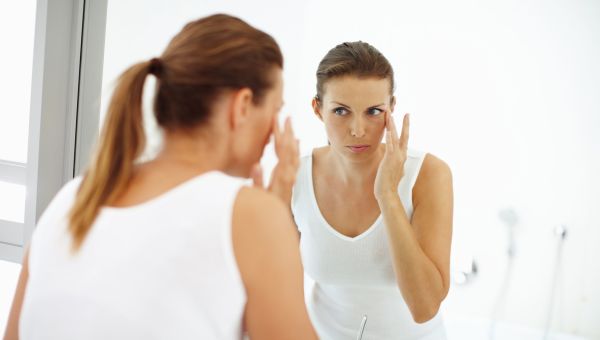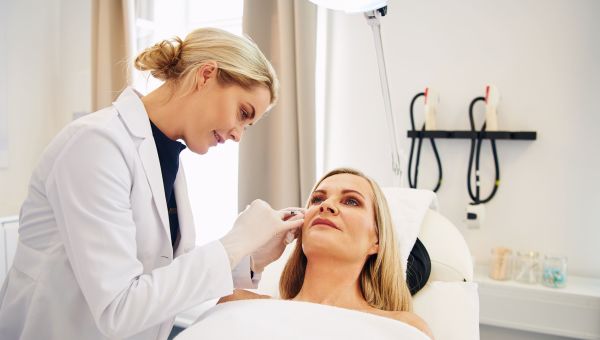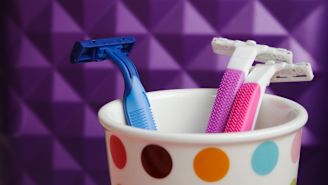5 myths about wrinkles, busted
Wrinkles are creases in the skin—most of which are the result of aging—and, unfortunately, there's little you can do to prevent them.

Wrinkles are a normal part of life for most of us. These pesky creases in our skin develop with age, but certain factors, like the sun and exposure to cigarette smoke, can speed up the process. Unfortunately, there is little you can actually do to slow down aging skin.
Avoiding exposure to smoke and protecting your skin from the sun can help, but what if the damage is already done? Before you invest in expensive serums that promise to rewind your biological clock, understand the top causes of wrinkles and what actually works to prevent and reverse these age-revealing grooves.
To bust five common untruths wide open, we enlisted the help of Michele Green, MD, a board-certified dermatologist from New York, New York. Here's what she had to say.

Myth: all wrinkles are the same
Not all wrinkles, known by the medical term rhytids, are the same; their causes vary, too. "Deeper wrinkles are definitely caused by the sun, and fine lines are more genetic wrinkles," according to Dr. Green.
Still, there are more variations.
- Dynamic wrinkles are caused by contracting the muscles in your face, like when you smile or frown. The skin overlying these muscles bunches together, causing lines between the eyebrows, on the forehead and on the outer corners of the eyes, called crow's feet. These wrinkles disappear when you relax the muscles in your face.
- Over time, facial movements form deeper ridges that don't bounce back into place. Known as static wrinkles, these can also be caused by sun damage, exposure to smoke and genetics.
- With age, skin can thin and lose fat, making it appear less full. These changes can cause sagging, and wrinkle folds that often appear between the nose and mouth.

Myth: You only need to wear sunscreen on sunny days
Protecting your skin during all types of weather, not just sunny days, is important. Lack of protection from the sun may result in early wrinkles. Experts believe between 80 and 90 percent of visible skin aging is caused by the sun. Even on cloudy days, up to 80 percent of the sun’s rays can reach your skin.
Sun damage happens gradually and can cause thick, leathery and winkled skin many years after the peak of sun exposure. Unfortunately, there is nothing that can be done to correct this damage. "People think that they can go bake in the sun and get all the wrinkles they want and then have it all treated," Green says. "Some are just etched into your face; some are not possible to be treated."
Daily exposure to low doses of UV rays causes the most damage overtime. To protect your skin before wrinkles form, use sunscreen every day. The Centers for Disease Control and Prevention (CDC) recommend choosing a sunscreen with at least an SPF of 15, while the American Academy of Dermatology recommends a water-resistant lotion with a minimum SPF of 30. Choose a sunscreen with broad-spectrum protection, which safeguards against UVB and UVA rays, the main cause of aging skin. Don't let sunscreen with a higher SPF fool you—you should still layer on the lotion often. Reapply every two hours or immediately after swimming, sweating or toweling dry. Green also recommends wearing a hat and sitting in a shaded area or under an umbrella.
Plan outdoor activities when the sun is lowest in the sky—usually early morning and late afternoon—and check the UV index, which measures the strength of the sun’s rays, before venturing out.

Myth: moisturizing your skin will reverse wrinkles
Not exactly. Your skin loses moisture as you age, making fine lines and wrinkles more pronounced. Most facial moisturizers don't reverse existing wrinkles or prevent future ones, but they can hydrate the skin, which plumps the face and reduces the appearance of fine lines.
However, certain creams and serums can help. "I always recommend retinol products," Green says. Retinoids, like retinol, can help increase cell turnover and thicken deeper layers of skin, reducing the appearance of fine lines and wrinkles. These products also can stimulate collagen production, which may prevent new wrinkles from forming. Some experts recommend adding retinoid products to your skincare routine as early as age 20.
Many of these products are available over the counter. When purchasing these creams, look for one with a high percentage of a retinoid, such as retinol, Green recommends; it might not always be the most (or least) expensive product on the market. Prescription retinoid products, like Retin-A are also available, although they can be harsh on the skin, Green says. They tend to be better at reducing the appearing of wrinkles, however. If you’re uncertain what to pick, your doctor or dermatologist may be able to provide a recommendation.

Myth: if your mom doesn't have wrinkles, you won't either
There's a bit of truth to this one. Genes play a role in the way your skin ages. The amount of melanin, the pigment that gives your skin color, affects how likely your skin is to burn. Those with fair skin are typically more sensitive to sun damage, which can age skin prematurely.
However, if your lifestyle is different from the other women in your family, your skin might reflect that. Stress, your diet, air pollution, the sun and cigarette smoke affect how and when your skin will show dark spots and wrinkles. Alcohol can also age the look of your skin, according to Green.

Myth: drinking water in excess can prevent (and reverse) wrinkles
Staying well hydrated, is good for your overall health, but drinking water in excess won't restore a youthful glow—or reverse the signs of aging.
Here's the truth: Drinking plenty of water and eating hydrating foods can slightly increase your skin's moisture levels, which might make fine lines less noticeable. But hydrating beyond your body’s needs won’t yield any extra aging benefits.
Everyone's hydration needs are different, but there are a few ways you can be sure you’re getting enough.
- Drink a glass with each of your meals
- Don't wait until you’re thirsty to sip
- Eat hydrating foods, like watermelon and cucumber
- Invest in a reusable water bottle
- Flavor your water with fresh fruit, like lemon, lime or grapefruit
Some people, like those with late stage kidney disease or heart failure, may need to limit their fluid intake. Speak with your doctor about your hydration needs and try each day to reach this goal.

The truth about treating wrinkles
Even if you reduce sun and smoke exposure, use retinoid products and hydrate, skin will still inevitably age. Wrinkles do not affect physical health but if you find them bothersome, there are more drastic steps you can take.
There are cosmetic treatments available, but they are elective procedures that may require significant costs. Wrinkle reducers include injectables, which plump soft tissue to reduce the appearance of wrinkles, and resurfacing techniques, like laser treatments and chemical peels. Surgical procedures are also available.
These treatments can be effective, but there's no way to magically erase wrinkles. Most methods are temporary. Some last anywhere from a few months to a year, depending on the treatment and severity of wrinkles. There are risks, too. Potential complications and reactions range from bruising, swelling and irritation to more serious problems, like infections. To limit your risk of severe complications, have procedures done by a licensed professional. Your primary care doctor may be able to refer you to a trustworthy dermatologist.
Wrinkle reducers are certainly not a medical necessity. A dermatologist can break down the cost and risks to help you decide if any of these treatments are right for you.
More On


video

article

slideshow


video


video
